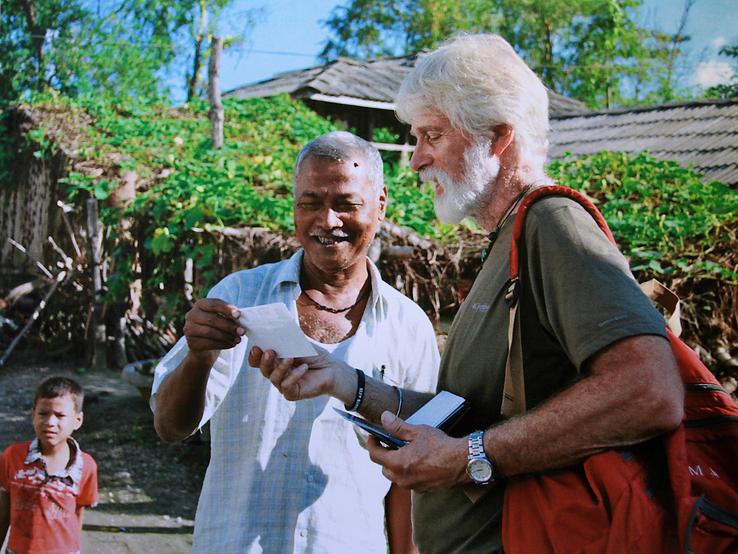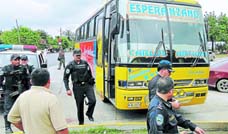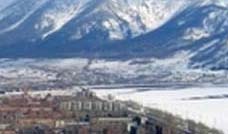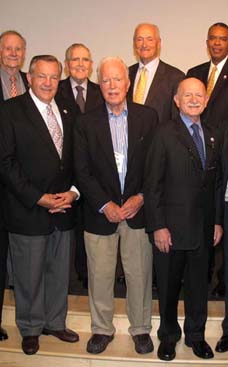
Life in the village could be a little challenging. This was the mid 1960s, long before cell phones, laptops and other technology that might offer one a sense of connection to the rest of civilization. "Katmandu was the nearest city," he said. "It took three days to get there." He recalled that roads in the region, at the time, were basically non-existent. "They were literally just dirt," he said, adding that travel through the jungle could be treacherous. "There were wild animals," he said. "Elephants, tigers, wild boar and a lot of snakes." He recalled one night there was a commotion in the village. When he asked what was going on he found out an elephant was tearing up the rice paddies. He said living among the wild did have its benefits, though. Mott said one time a tiger had killed an antelope in the jungle and had eaten part of it. "I came upon the rest, took it back, cleaned it and skinned it and ate the rest," he said. Encountering deadly snakes was more common. "Once I was out pulling seedlings in my bare feet and a cobra went right over my feet. I still get chills thinking about it." Medical care was pretty much non-existent in the village. "I was the most qualified doctor in the area because I had a little medical kit," he said.
RPCV Stephen Mott visited Santapur, the village where he worked in the 1960s, during a recent return trip to Nepal
Norwell resident Stephen Mott shares Peace Corps experience
GateHouse News Service
Posted Mar 17, 2011 @ 05:22 AM
Caption: Stephen Mott visited Santapur, the village where he worked in the 1960s, during a recent return trip to Nepal. During the visit, he met with Madhev Chodry, a man he'd known during his Peace Corps experience.
Norwell -
For two years he lived in a remote jungle in a southeastern district of Nepal.
There was no electricity, nor was there running water.
His hut held a wooden table, a chair and a kerosene lamp. That table, he also used as his bed.
The walls of the hut were sprayed with DDT but the mosquitoes were still relentless.
He took malaria pills to keep himself alive.
He lost 45 lbs. to dysentery, which he suffered for the length of his stay.
But Norwell resident Stephen Mott, Jr. looks back on that experience fondly. It was the 1960s and Mott was in his early 20s, recently graduated from college and ready for adventure.
So he joined the Peace Corps.
"I have no idea why I decided to join," Mott said in an interview earlier this month, but the experience changed him profoundly.
"I became a really different person," he said. "For the better."
This year - 2011 - marks the 50th anniversary of the Peace Corps and in an interview earlier this month Mott spoke about his experience with the organization, reminiscing about his term from 1966 to 1968.
Mott recalled that after three weeks of training in Hawaii, he was shipped over to Nepal, a very different environment from his hometown of Norwell.
"You had to take a truck over three mountain ranges and walk 27 miles through the jungle to get to this village," Mott said of reaching Santapur, a Nepalese village.
In the Peace Corps, Mott said he was a JTA – junior technical assistant - dealing with agriculture.
"At the time the green revolution was starting," he said, explaining that the ‘green revolution' was the development of grains that grew stronger and faster and were drought-resistant, yielding better crops.
"My main job was to convince farmers to try this new stuff," Mott said.
By the second season all the farmers were trying the seeds, he said.
"The yield was spectacular," he said. "It was a great feeling."
Life in the village, though, could be a little challenging.
This was the mid 1960s, long before cell phones, laptops and other technology that might offer one a sense of connection to the rest of civilization.
"Katmandu was the nearest city," he said. "It took three days to get there."
He recalled that roads in the region, at the time, were basically non-existent.
"They were literally just dirt," he said, adding that travel through the jungle could be treacherous. "There were wild animals," he said. "Elephants, tigers, wild boar and a lot of snakes."
He recalled one night there was a commotion in the village. When he asked what was going on he found out an elephant was tearing up the rice paddies.
He said living among the wild did have its benefits, though.
Mott said one time a tiger had killed an antelope in the jungle and had eaten part of it.
"I came upon the rest, took it back, cleaned it and skinned it and ate the rest," he said.
Encountering deadly snakes was more common.
"Once I was out pulling seedlings in my bare feet and a cobra went right over my feet. I still get chills thinking about it."
Medical care was pretty much non-existent in the village.
"I was the most qualified doctor in the area because I had a little medical kit," he said.
Mott said there were three seasons in Nepal.
"The first season was nice," he said.
The second season was really hot.
"It got up to 115 degrees," he said. "Nothing would grow. There was not much to eat during this time."
The third season was monsoon season.
He recalled being at the district headquarters of the Nepalese district agricultural development officer in the small village of Gaur.
There were a few men from Santapur there as well.
"It started to rain and they told me we had better leave or we might not make it back to the village," Mott said.
As they headed back through the jungle Mott said a stream had breached because of the rain.
"We were up to our waist in the water. We ended up killing three cobras. What normally took three hours took 12."
He said the village was cut off because roads and paths had been washed away.
"I didn't get out of the village for two months," he said.
Adapting to the local diet was also something Mott said was a bit of an adjustment at first.
"The food was all curried," he said. "And it was spicy."
With his $1/day allowance from the Peace Corps, Mott said he was able to occasionally afford a chicken or some goat meat.
"But mostly I ate rice and vegetables."
Water was a different story, however.
"The water was disgusting," he said. "That's why I was always sick."
Bathing involved getting a bucket of water and heating it up in a teakettle.
Even politics was scary back then, he said.
"There was a land war going on between India and China," he said. " There were places we were not allowed to go because they couldn't guarantee our safety."
Mott said his priorities definitely changed as a result of his experience, and he had a new appreciation for what in life is really important.
For example, he said while he was in the village he received a letter from a friend back in the states.
"[My friend] was upset because General Motors was on strike and he couldn't get his Corvette," Mott said. "Meanwhile, in the village a villager needed money to buy wood he needed to cremate his wife."
Mott said he helped train the next group of Peace Corps volunteers who were going to be working in Nepal, before heading back home.
When his assignment was over, Mott left the area without fanfare.
"I was very sad getting on the plane," he said.
He said returning home proved a more difficult task than going over.
"In 1966 it was the Beach Boys and when I got back in '68 it was Janis Joplin," he said. "A lot of social changes had taken place in two years."
Shortly after returning home, Mott said he worked for VISTA (Volunteers In Service To America), the domestic version of the Peace Corps.
In 1973, Mott began teaching social studies at Norwell High School, the school he had graduated from. Class of 1961.
He eventually became the department chair, and retired from teaching in 2003.
"I loved it," he said of teaching. "It was the best job ever."
While teaching at Norwell High School, Mott met his wife, Missy, who was the school's social health director.
"I guess you could say we were high school sweethearts," he said.
Mott returned to Santapur in October of last year with his wife and their son Nicolas. It was the first time he had been back in more than 40 years.
"I had seen a travel brochure that offered a strenuous trek in Nepal," he said. "And an escapade to [Mt.] Everest. I figured I'm not getting any younger. Why not go now?"
Mott and his family made it to base camp on Everest.
"It was hard," he said.
When he returned to the village he'd worked in during his Peace Corps stint, he said he didn't recognize anyone at first.
"I tried to tell people who I was and that I had been there before," he said.
Then a man came out of one of the houses.
"He remembered me," Mott said. "He came over and said, ‘Hey, Steve'."
Mott said he talked with the man for hours.
He said it was clear the village had prospered over the years. The mud huts were gone, replaced by wooden houses.
"Some even had second floors," Mott said.
Politics in the region had also changed.
"When I was there before, the king had complete power. If he wanted you killed, you were killed. Now they are in the process of being a constitutional monarchy."
And the rice he had introduced to the village more than four decades ago was still being used.
"It was very cool to see the rice growing in the fields ready to be harvested 45 years later," he said.















